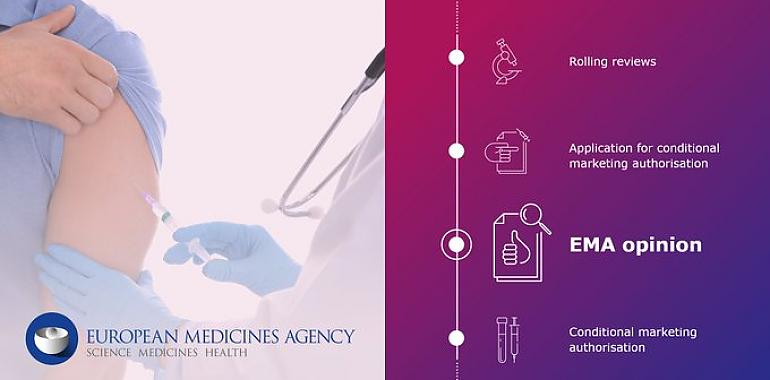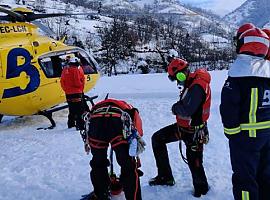La Agencia Europa del Medicamento da luz verde a la vacuna contra el #COVID19 de Moderna. Este medicamento, que previene a partir de los 16 años, se convertirá en la segunda vacuna con autorización de comercialización condicional en la UE.
La EMA recomienda la autorización de la segunda vacuna frente a la COVID-19
-
Esta vacuna, desarrollada por Moderna, previne la enfermedad causada por SARS-CoV-2 en personas a partir de los 16 años
-
El CHMP, formado por expertos de las autoridades competentes, entre ellas la AEMPS, ha completado su evaluación científica antes de tiempo concluyendo por consenso que el balance beneficio-riesgo es positivo y se dispone de datos suficientemente sólidos sobre la calidad, seguridad y eficacia de esta vacuna
-
Como ocurre con el resto de medicamentos autorizados por el procedimiento centralizado, la Comisión Europea será la encargada de otorgar la autorización para que el medicamento pueda distribuirse en todos los Estados miembro de la UE
-
El ensayo clínico ha contado con la participación de más de 30.000 personas y ha demostrado una eficacia del 94,1%
La Agencia Europea del Medicamento (EMA, por sus siglas en inglés) ha recomendado que se otorgue una autorización de comercialización condicional a la vacuna frente a la COVID-19 desarrollada por la compañía estadounidense Moderna. Este medicamento, que previene la enfermedad causada por el SARS-CoV-2 en personas a partir de los 16 años, se convertirá así en la segunda vacuna en obtener una autorización de comercialización condicional en la Unión Europea, tras la desarrollada por BioNTech y Pfizer.
El Comité de Medicamentos de Uso Humano (CHMP, por sus siglas en inglés) de la EMA, formado por expertos de las autoridades competentes de los diferentes Estados Miembros de la UE, entre ellos la Agencia Española de Medicamentos y Productos Sanitarios (AEMPS), ha completado su evaluación científica concluyendo por consenso que dispone de datos suficientemente sólidos sobre la calidad, seguridad y eficacia de la vacuna para recomendar una autorización de comercialización condicional. Es decir, que el balance beneficio-riesgo en el que se basa la evaluación de cualquier medicamento, es positivo.
Al igual que con el resto de medicamentos autorizados por procedimiento centralizado, como sucedió el pasado 21 de diciembre con Comirnaty de BioNTech y Pfizer, la Comisión Europea será la encargada de otorgar la autorización para que la vacuna desarrollada por Moderna pueda distribuirse en todos los Estados miembro de la UE.
La autorización de comercialización condicional es un instrumento contemplado en la legislación europea que permite una autorización ante una necesidad médica no cubierta, en la medida en que el beneficio para la salud pública de su inmediata disponibilidad es superior a la incertidumbre derivada de la limitación de los datos disponibles. Este tipo de autorización no es específica para esta situación; se ha concedido fuera y dentro de la pandemia y requiere de más datos que una autorización para situaciones de emergencia como la que se concede en otras regiones regulatorias.
La autorización de la vacuna de Moderna se basa en un ensayo clínico pivotal doble-ciego (se administra la vacuna o un placebo enmascarados de manera que se impida su identificación a simple vista), aleatorizado, frente a placebo que incluyó a más de 30.000 adultos mayores de 18 años que fueron vacunados con dos dosis de 100 microgramos, separadas por un intervalo de 28 días. En el análisis intermedio de los resultados se observaron 196 casos de enfermedad por coronavirus, 185 con placebo y 11 con la vacuna, lo que permitió estimar una eficacia vacunal del 94,1 %.
EMA recommends COVID-19 Vaccine Moderna for authorisation in the EU
EMA has recommended granting a conditional marketing authorisation for COVID-19 Vaccine Moderna to prevent Coronavirus disease (COVID-19) in people from 18 years of age. This is the second COVID-19 vaccine that EMA has recommended for authorisation.
EMA’s human medicines committee (CHMP) has thoroughly assessed the data on the quality, safety and efficacy of the vaccine and recommended by consensus a formal conditional marketing authorisation be granted by the European Commission. This will assure EU citizens that the vaccine meets EU standards and puts in place the safeguards, controls and obligations to underpin EU-wide vaccination campaigns.
“This vaccine provides us with another tool to overcome the current emergency,” said Emer Cooke, Executive Director of EMA. “It is a testament to the efforts and commitment of all involved that we have this second positive vaccine recommendation just short of a year since the pandemic was declared by WHO.
“As for all medicines, we will closely monitor data on the safety and effectiveness of the vaccine to ensure ongoing protection of the EU public. Our work will always be guided by the scientific evidence and our commitment to safeguard the health of EU citizens.”
A very large clinical trial showed that COVID-19 Vaccine Moderna was effective at preventing COVID-19 in people from 18 years of age.
The trial involved around 30,000 people in total. Half received the vaccine and half were given dummy injections. People did not know whether they received the vaccine or the dummy injections.
Efficacy was calculated in around 28,000 people from 18 to 94 years of age who had no sign of previous infection.
The trial showed a 94.1% reduction in the number of symptomatic COVID-19 cases in the people who received the vaccine (11 out of 14,134 vaccinated people got COVID-19 with symptoms) compared with people who received dummy injections (185 out of 14,073 people who received dummy injections got COVID-19 with symptoms). This means that the vaccine demonstrated a 94.1% efficacy in the trial.
The trial also showed 90.9% efficacy in participants at risk of severe COVID-19, including those with chronic lung disease, heart disease, obesity, liver disease, diabetes or HIV infection. The high efficacy was also maintained across genders, racial and ethnic groups.
COVID-19 Vaccine Moderna is given as two injections into the arm, 28 days apart. The most common side effects with COVID-19 Vaccine Moderna were usually mild or moderate and got better within a few days after vaccination. The most common side effects are pain and swelling at the injection site, tiredness, chills, fever, swollen or tender lymph nodes under the arm, headache, muscle and joint pain, nausea and vomiting. The safety and effectiveness of the vaccine will continue to be monitored as it is used across the EU, through the EU pharmacovigilance system and additional studies by the company and by European authorities.
Where to find more information
The product information approved by the CHMP for COVID-19 Vaccine Moderna contains prescribing information for healthcare professionals, a package leaflet for members of the public and details of conditions of the vaccine’s authorisation.
An assessment report with details of EMA’s evaluation of COVID-19 Vaccine Moderna, and the full risk management plan, will be published within days. Clinical trial data submitted by the company in the application for marketing authorisation will be published on the Agency’s clinical data website in due course.
More information is available in an overview of the vaccine in lay language, including a description of the vaccine’s benefits and risks and why EMA recommended its authorisation in the EU.
How COVID-19 Vaccine Moderna works
COVID-19 Vaccine Moderna works by preparing the body to defend itself against COVID-19. It contains a molecule called messenger RNA (mRNA) which has instructions for making the spike protein. This is a protein on the surface of the SARS-CoV-2 virus which the virus needs to enter the body’s cells.
When a person is given the vaccine, some of their cells will read the mRNA instructions and temporarily produce the spike protein. The person’s immune system will then recognise this protein as foreign and produce antibodies and activate T cells (white blood cells) to attack it.
If, later on, the person comes into contact with SARS-CoV-2 virus, their immune system will recognise it and be ready to defend the body against it.
The mRNA from the vaccine does not stay in the body but is broken down shortly after vaccination.
Conditional marketing authorisation
The European Commission will now fast-track the decision-making process to grant a decision on the conditional marketing authorisation for COVID-19 Vaccine Moderna, allowing vaccination programmes to be rolled out across the EU.
A conditional marketing authorisation is one of EU’s regulatory mechanisms for facilitating early access to medicines that fulfil an unmet medical need, including in emergency situations such as the current pandemic.
A conditional marketing authorisation is a formal authorisation of the vaccine, covering all batches produced for the EU and providing a robust assessment to underpin vaccination campaigns.
As COVID-19 Vaccine Moderna is recommended for a conditional marketing authorisation, the company that markets COVID-19 Vaccine Moderna will continue to provide results from the main trial, which is ongoing, for 2 years. This trial and additional studies will provide information on how long protection lasts, how well the vaccine prevents severe COVID-19, how well it protects immunocompromised people, children and pregnant women, and whether it prevents asymptomatic cases.
The company will also carry out studies to provide additional assurance on the pharmaceutical quality of the vaccine as the manufacturing continues to be scaled up.
Monitoring the safety of COVID-19 Vaccine Moderna
In line with the EU’s safety monitoring plan for COVID-19 vaccines, COVID-19 Vaccine Moderna will be closely monitored and subject to several activities that apply specifically to COVID-19 vaccines. Although large numbers of people have received COVID-19 vaccines in clinical trials, certain side effects may only emerge when millions of people are vaccinated.
Companies are required to provide monthly safety reports in addition to the regular updates required by the legislation and conduct studies to monitor the safety and effectiveness of the vaccines as they are used by the public. In addition, independent studies of COVID-19 vaccines coordinated by EU authorities will also give more information on the vaccine’s long-term safety and benefit in the general population.
These measures will allow regulators to swiftly assess data emerging from a range of different sources and take appropriate regulatory action to protect public health if needed.
Assessment of COVID-19 Vaccine Moderna
During the assessment COVID-19 Vaccine Moderna, the CHMP had the support of EMA’s safety committee, PRAC, who assessed the risk management plan of COVID-19 Vaccine Moderna, and the COVID-19 EMA pandemic task force (COVID-ETF), a group that brings together experts from across the European medicines regulatory network to facilitate rapid and coordinated regulatory action on medicines and vaccines for COVID-19.




















